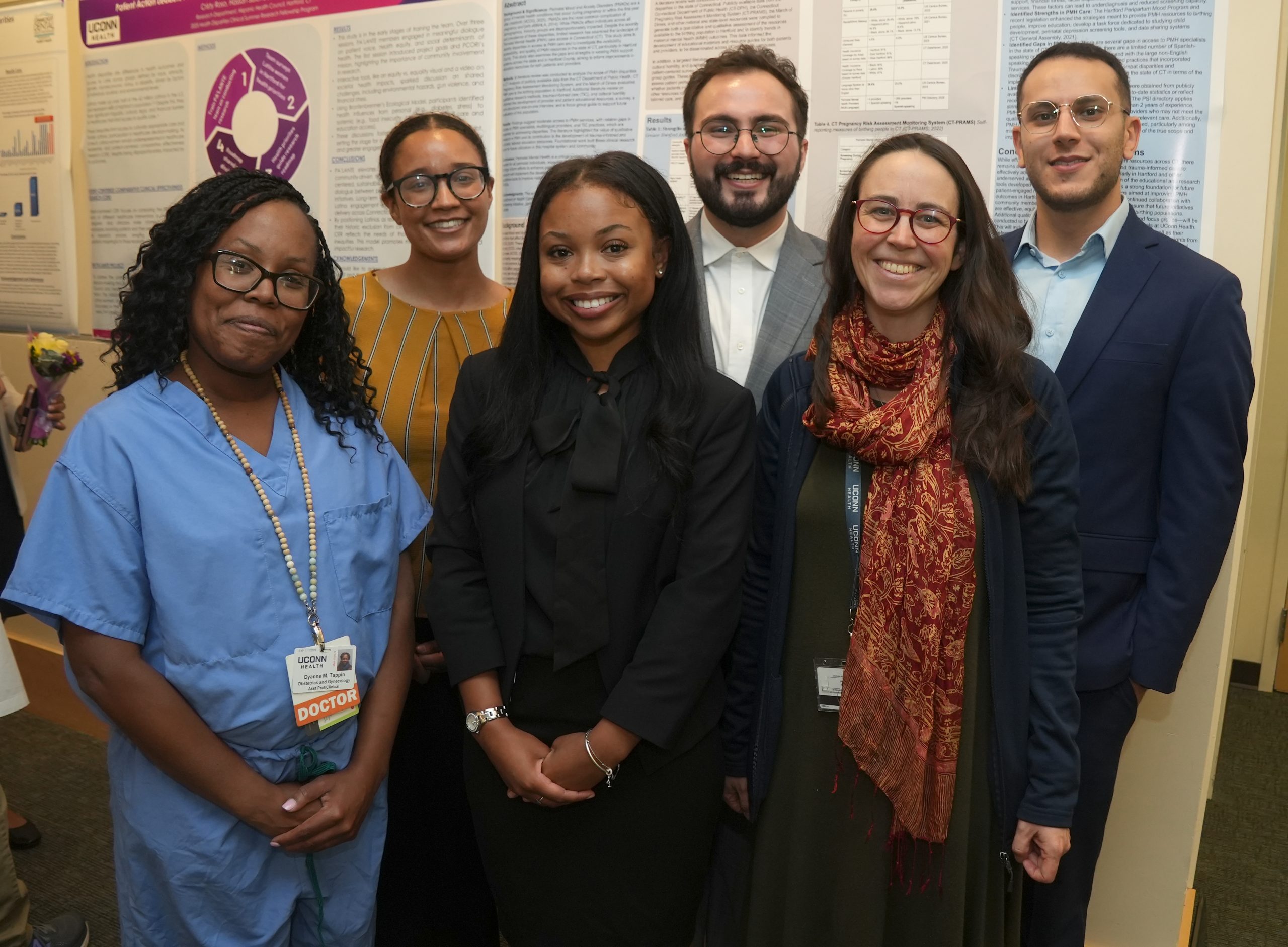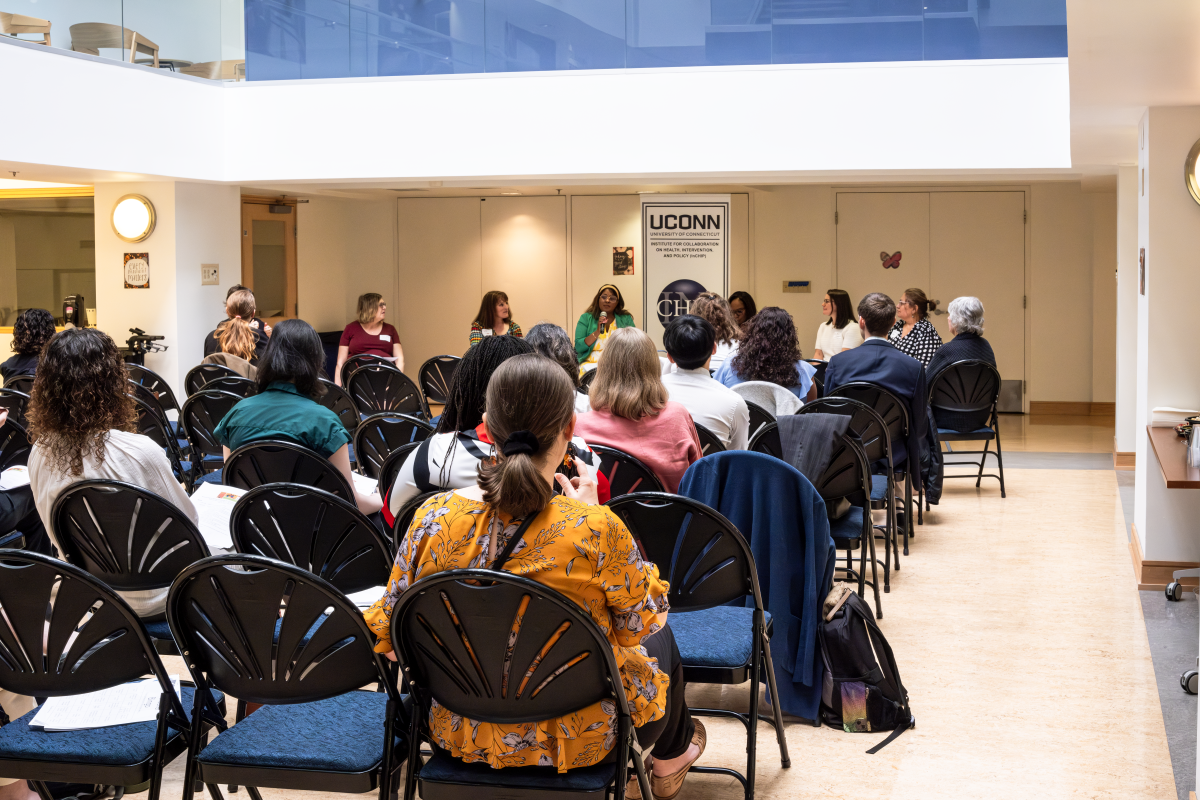UConn Orchard Grows Thanks to Local Farmer
A donation of approximately 100 apple trees will be used for fruit production research in a corner of the new UConn Orchard.
The orchard is part of the College of Agriculture, Health and Natural Resources (CAHNR), and is part of a newly launched effort to reestablish UConn’s longstanding fruit research and education program.
The two-year-old Fuji Supreme and Ambrosia apple trees come to the UConn orchard courtesy of Steve McMenamin, a farmer who runs an organic produce farm in Greenwich, Connecticut.
McMenamin worked with Evan Lentz, an assistant extension educator in UConn Extension and the Department of Plant Science and Landscape Architecture, to put in a new apple orchard on his farm.
At the end of the project, McMenamin had about 1,700 trees left over, so he and his partner, Ingrid Delson, decided to donate them to UConn.
“The reason we chose UConn is because [the University] has a wonderful cooperative extension person in Evan Lentz,” McMenamin says. “He’s been so helpful to us, so when we had extra trees, my first thought was ‘let’s donate them to UConn because of Evan’s work’.”
UConn will use about 100 of these trees in the orchard. The program also held a tree sale for other local growers and homeowners using the trees donated by McMenamin. The proceeds will support educational and research opportunities at the orchard.
“Connecticut Department of Agriculture is proud to support the revitalization of the UConn orchard by purchasing and donating the fruit trees back,” says Connecticut Department of Agriculture Commissioner Bryan P. Hurlburt. “Our orchards are a part of our communities and way of life. Having research and education opportunities to support this industry, in the face of climate change, will ensure that they continue to provide fresh, local, and healthy food options for residents.”
Most of UConn’s growing orchard will be dedicated to teaching and UConn Extension demonstrations. But the newly planted plot with McMenamin’s donation will be used for research.
The establishment of the orchard will enable fruit research to resume at UConn after a decades-long hiatus.
“The value is pretty immense,” says Lentz, who earned his bachelor’s and master’s from CAHNR in 2019 and 2022. “We haven’t had any fruit research going on at UConn in a really long time, and these fruit trees are the first step in getting the fruit program back up and running and giving UConn a name in the fruit production world again.”
CAHNR researchers will be investigating questions such as organic methods of controlling Fire Blight, one of the most devastating diseases for apple trees.
Research on the plot could begin as soon as 2026.
“We’re going to be really pushing these trees over the next couple years to make sure that they’re mature enough to bear a significant amount of fruit,” Lentz says.
Helena, an agricultural chemical company has also donated $15,000 to the project. Lentz says the company will have the opportunity to conduct trials of their products in conjunction with UConn researchers in the orchard.
“I thought it was really important to get ourselves up and running, so we’re able to cultivate partnerships with different stakeholders,” Lentz says.
This project will support undergraduate student researchers who will be trained to work in the field after graduation rather than seeking additional training at institutions outside of Connecticut.
“Not only are we getting this infusion of money to our program, but we’re also giving students opportunities for applied, hands-on, experiential learning which is a really important part of all of this,” Lentz says.
This research will reach growers directly through the College’s extension arm.
“It’s important that we’re getting all of this information into the hands of the growers, so they see the impact of this,” Lentz says.
This work would, in turn, support Connecticut’s fruit growing industry.
“We really hope the new orchard succeeds and hopefully it inspires others to donate and help the UConn project,” McMenamin says. “We also hope it inspires other Connecticut growers to get back to fruit production.”
This work relates to CAHNR’s Strategic Vision area focused on Ensuring a Vibrant and Sustainable Agricultural Industry and Food Supply.
Follow UConn CAHNR on social media
Latest UConn Today
- Incoming UConn Medical Students Get Hands-On Summer Research ExperienceFor the first time the Health Career Opportunities Program of UConn Health offered matriculating UConn medical students summer research opportunities.
- Partnering with Communities to Improve HealthInCHIP’s Community Engagement Research Core’s latest networking event offers insights for successful community research partnerships
- Study Highlights Higher Rates, Risk Factors for Non-Fatal OverdosesA new opioid overdose study has identified several key risk factors associated with non-fatal overdoses drawing from a sample of people who use opioids in New Haven
- Archiving for Justice, Truth, and Memory: Unpacking the Baggage of What Went BeforeReflections on the importance of the newest addition to UConn’s ICTY Digital Archives, the Srebrenica Genocide Archives Collection.
- Multiple Sclerosis Patient Sees Bright FutureFrom unheard to understood
- UConn AUKUS Scholars Explore Undersea Vehicle Technology, International Collaborations in AustraliaFive College of Engineering students studied systems thinking and interdisciplinary teamwork essential in modern undersea vehicle development












